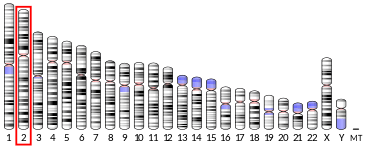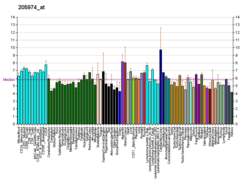HOXD1
Homeobox protein Hox-D1 is a protein that in humans is encoded by the HOXD1 gene.[5][6][7]
This gene is a member of the Antp homeobox family and encodes a protein with a homeobox DNA-binding domain. This nuclear protein functions as a sequence-specific transcription factor that is involved in differentiation and limb development. Mutations in this gene have been associated with severe developmental defects on the anterior-posterior (a-p) limb axis.[7]
See also
References
- GRCh38: Ensembl release 89: ENSG00000128645 - Ensembl, May 2017
- GRCm38: Ensembl release 89: ENSMUSG00000042448 - Ensembl, May 2017
- "Human PubMed Reference:". National Center for Biotechnology Information, U.S. National Library of Medicine.
- "Mouse PubMed Reference:". National Center for Biotechnology Information, U.S. National Library of Medicine.
- McAlpine PJ, Shows TB (Aug 1990). "Nomenclature for human homeobox genes". Genomics. 7 (3): 460. doi:10.1016/0888-7543(90)90186-X. PMID 1973146.
- Scott MP (Dec 1992). "Vertebrate homeobox gene nomenclature". Cell. 71 (4): 551–3. doi:10.1016/0092-8674(92)90588-4. PMID 1358459.
- "Entrez Gene: HOXD1 homeobox D1".
Further reading
- Boncinelli E, Acampora D, Pannese M, et al. (1990). "Organization of human class I homeobox genes". Genome. 31 (2): 745–56. doi:10.1139/g89-133. PMID 2576652.
- Manohar CF, Salwen HR, Furtado MR, Cohn SL (1996). "Up-regulation of HOXC6, HOXD1, and HOXD8 homeobox gene expression in human neuroblastoma cells following chemical induction of differentiation". Tumour Biol. 17 (1): 34–47. doi:10.1159/000217965. PMID 7501971.
- Guazzi S, Lonigro R, Pintonello L, et al. (1994). "The thyroid transcription factor-1 gene is a candidate target for regulation by Hox proteins". EMBO J. 13 (14): 3339–47. doi:10.1002/j.1460-2075.1994.tb06636.x. PMC 395231. PMID 7913891.
- Manohar CF, Furtado MR, Salwen HR, Cohn SL (1993). "Hox gene expression in differentiating human neuroblastoma cells". Biochem. Mol. Biol. Int. 30 (4): 733–41. PMID 8104620.
- Del Campo M, Jones MC, Veraksa AN, et al. (1999). "Monodactylous limbs and abnormal genitalia are associated with hemizygosity for the human 2q31 region that includes the HOXD cluster". Am. J. Hum. Genet. 65 (1): 104–10. doi:10.1086/302467. PMC 1378080. PMID 10364522.
- Adjaye J, Monk M (2000). "Transcription of homeobox-containing genes detected in cDNA libraries derived from human unfertilized oocytes and preimplantation embryos". Mol. Hum. Reprod. 6 (8): 707–11. doi:10.1093/molehr/6.8.707. PMID 10908280.
- Limongi MZ, Pelliccia F, Gaddini L, Rocchi A (2000). "Clustering of two fragile sites and seven homeobox genes in human chromosome region 2q31→q32.1". Cytogenet. Cell Genet. 90 (1–2): 151–3. doi:10.1159/000015651. PMID 11060466.
- Appukuttan B, Sood R, Ott S, et al. (2001). "Isolation and characterization of the human homeobox gene HOX D1". Mol. Biol. Rep. 27 (4): 195–201. doi:10.1023/A:1011048931477. PMID 11455954.
- Pitera JE, Milla PJ, Scambler P, Adjaye J (2002). "Cloning of HOXD1 from unfertilised human oocytes and expression analyses during murine oogenesis and embryogenesis". Mech. Dev. 109 (2): 377–81. doi:10.1016/S0925-4773(01)00530-5. PMID 11731253.
- Kosaki K, Kosaki R, Suzuki T, et al. (2002). "Complete mutation analysis panel of the 39 human HOX genes". Teratology. 65 (2): 50–62. doi:10.1002/tera.10009. PMID 11857506.
- Strausberg RL, Feingold EA, Grouse LH, et al. (2003). "Generation and initial analysis of more than 15,000 full-length human and mouse cDNA sequences". Proc. Natl. Acad. Sci. U.S.A. 99 (26): 16899–903. doi:10.1073/pnas.242603899. PMC 139241. PMID 12477932.
External links
- HOXD1+protein,+human at the US National Library of Medicine Medical Subject Headings (MeSH)
This article incorporates text from the United States National Library of Medicine, which is in the public domain.
This article is issued from Wikipedia. The text is licensed under Creative Commons - Attribution - Sharealike. Additional terms may apply for the media files.





